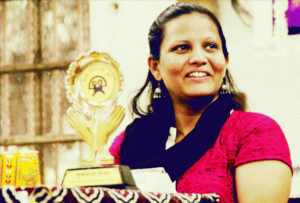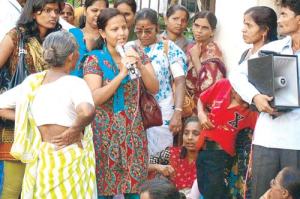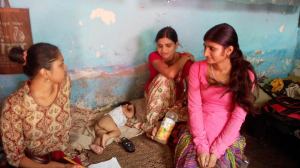The question isn’t who’s going to let me; it’s who is going to stop me. ~Ayn Rand
Mumtaz Shaikh’s eyes blaze as she speaks passionately about a campaign she has made her mission and she shouts out her ask from the municipal commissioner of the metropolis of Mumbai – “I want the right to pee!” Her demand is for free public facilities for women so that they can urinate safely. “Men in the city have 3000 free public urinals and women do not have a single one! Do planners of towns think we are less human?” she asks. “I want basic dignity for all my sisters in the city who set foot out of the house in dread every day, wondering how they will relieve themselves if the need arises.”
Mumtaz’s journey has been as unique as her campaign. She grew up in a house where daily beatings by her ‘father figure’, actually a goon from the area who coerced her estranged mother to co-habit with him, were a regular serving to her mother. She silently watched from behind the curtain fervently hoping for the violence to stop till one day when the hands stopped pounding her mother, they found release beating down on her petite frame. In desperation, her mother sent Mumtaz to live in a ghetto with her distant uncle hoping it would give her the much-needed respite, but the relief was soon overcome by deep poverty. Mumtaz’s uncle already had seven mouths to feed and hers was an unwanted addition which strained his meager resources further. She worked hard on household chores to pay back what she could in return for the shelter offered to her, but often went to bed without even one square meal. Her troubled childhood gave way to an early youth and her uncle married her off to a man from within the community who turned out every bit as difficult as her ‘father figure’ had been. He was extremely possessive and put her under a burqua, disallowing her to even look out of an open window without his consent. It was when she gave birth to her daughter at the age of 16, that it dawned on Mumtaz that if she did not take steps to alter her situation, her child’s destiny may very likely mirror hers. By now, Mumtaz was no longer a child and made up her mind to somehow empower herself, only she did not know how just yet.
The answer came in the form of a Non-Government Organization called (Committee of Resource Organizations ) CORO which entered Mumtaz’s slum community to hold afternoon meetings, once the men were at work, to speak to women on the issue of domestic violence. While her husband was very resistant to her leaving the house without permission, Mumtaz would steal out quietly and join the group of women huddled together to listen to the social workers. Very soon she found herself actively participating in designing small interventions to prevent episodes of violence in the immediate environment. She strongly voiced that all issues of sanitation, violence and illiteracy plaguing her community could only be resolved by the people living there. ‘It is our mess and we have to clean it’. As her belief in the organization grew, her voice became louder and she signed up as a volunteer for CORO. This did not go down well with her husband and there were fights every day. But with the strength of her group behind her Mumtaz fought for a divorce and was able to walk out of her marriage. She also reclaimed the accommodation that her mother had bequeathed her at an earlier time and put a firm roof over her head. Now there were no chains binding her feet, and there was no stopping her!
She helped to set up over 75 self-help groups within her community to fight domestic violence and support awareness on the issue in the area. Most of these women were from very low-income families and the support from their peers went a long way to provide solutions to their troubled lives. By now, Mumtaz had become a role-model and leader in the cluster she lived in. She was selected for a fellowship by international organization Leaders Quest for her advocacy of women’s rights and her crusade against domestic violence. She also joined the permanent staff of CORO to actively mentor other grass root leaders.
Her constant search for means to improve her fellow women’s lives led her to advocate the Right to Pee campaign which was a very big success. She spoke fearlessly from many platforms and approached the municipality with petitions to address the very basic needs of the women in the city of Mumbai. In 2013, government finally introduced a policy which mandated the construction of a women’s toilet block at every 20 kilometers within the city. The gender budget has also allocated 5 Cr rupees for the construction of 147 toilets which will be specially designed for women. The model toilet is soon to be inaugurated in the Chembur area of Mumbai. Her efforts were widely recognized and Mumtaz was awarded the title of ‘Daughter of Maharashtra’ by her state.
The very community that pointed fingers at Mumtaz for her activism now deeply respects her for standing up for women’s rights and gender equality. She is a true deliberate leader who is setting up models and local solutions that can be replicated to solve similar problems globally. Mumtaz has further made up her mind to contest the local elections in 2017 to take forward her work. Such is the remarkable story of this little lost girl who has gone on to be a pathfinder for millions of women.




